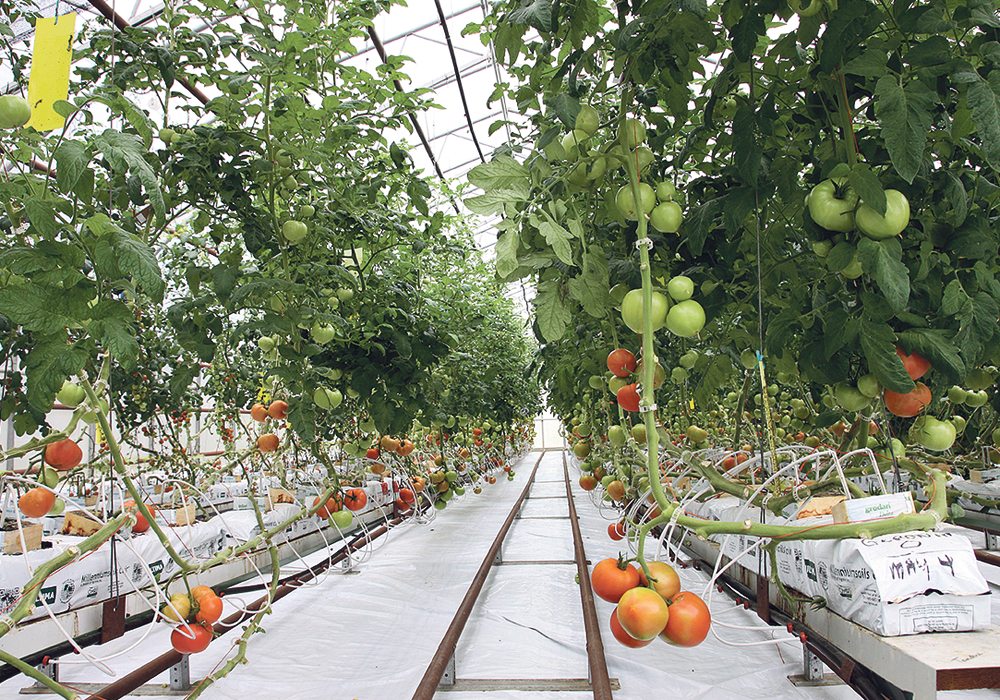Government doesn’t consider greenhouses to be farms, which means they must pay overtime and statutory holidays
If you grow commercial vegetables, flowers or tree seedlings in a greenhouse, are you a farmer?
Alberta’s greenhouse growers say the answer is yes, so they should be subject to farm employment standards.
Alberta Labour says the answer is no, and the above noted greenhouse operations are subject to the labour standards of the province’s non-agricultural sectors.
The distinction matters because greenhouses face higher labour costs if they don’t fall under farm and ranch legislation.
Alberta’s new employment standards code came into effect Jan. 1. It included changes to overtime and holiday pay for most sectors and various exemptions for paid non-family employees on farms and ranches.
Read Also

Farming Smarter receives financial boost from Alberta government for potato research
Farming Smarter near Lethbridge got a boost to its research equipment, thanks to the Alberta government’s increase in funding for research associations.
Greenhouses, nurseries and mushroom and sod farms were specifically listed as “not considered farms under the employment standards code.”
Albert Cramer, president of the Alberta Greenhouse Growers Association, said members had asked the government for a variance so they could be included under farm and ranch employment standards, but their request was not granted.
Now they have invited Alberta Labour Minister Christina Gray to tour southern Alberta greenhouses and give them another chance to make their case.
“We’re going to try to convince her that this is agriculture, growing vegetables under greenhouses, and right now we’re having a struggle,” Cramer said.
“It’s kind of funny (that) we have to convince the government that we’re agriculture. We’re agriculture in everything else but labour.”
New legislation will require greenhouses to pay employees for overtime and statutory holidays whether or not they work on those days. If they do work on those holidays, pay is at time and a half.
Under farm and ranch legislation, employers are not required to pay overtime to paid non-family workers.
Cramer said greenhouses don’t operate on the basis of eight-hour days. Certain times in the growing cycle are busier than others and require employees to work longer hours.
However, the requirement to pay overtime, plus at least one day’s pay for every statutory holiday, adds to costs that growers say they cannot recoup.
Cramer said Alberta Labour didn’t explain why it excluded greenhouses from farm and ranch labour rules.
“Greenhouses in Alberta were always a little bit distinct from other agriculture because of the flowers and tree seedlings,” Cramer said.
“They viewed them as not farm essentials. So vegetables, we were in that grey area.”
He added there was some opinion that greenhouse vegetable growers were not farmers because they grow crops under cover and can control the environment.
But dairies, hog and chicken operations are also under cover in controlled conditions, so the AGGA did not accept that opinion.
Cramer said the extra labour costs imposed on Alberta greenhouse growers put the industry at a disadvantage to its main competitors in Ontario and British Columbia, where similar growers are considered to be agricultural.
The AGGA did a survey of employees late last year in which 86 percent said they’d prefer to work more hours rather than get overtime pay. That likely means they fear greenhouses will reduce their hours to avoid the need to pay overtime and potentially hire more foreign workers to compensate.


















